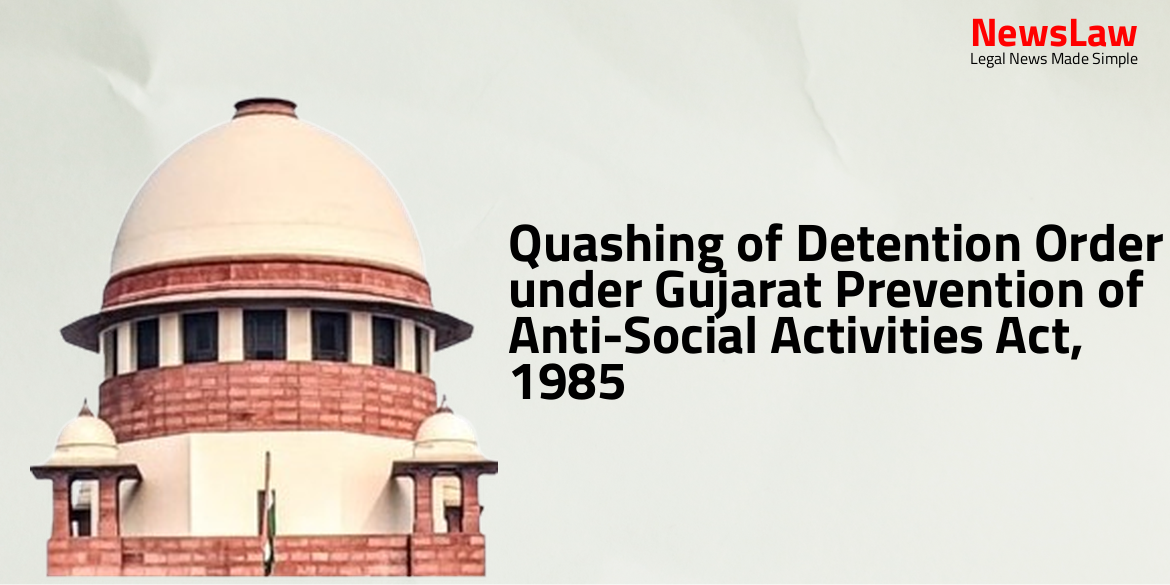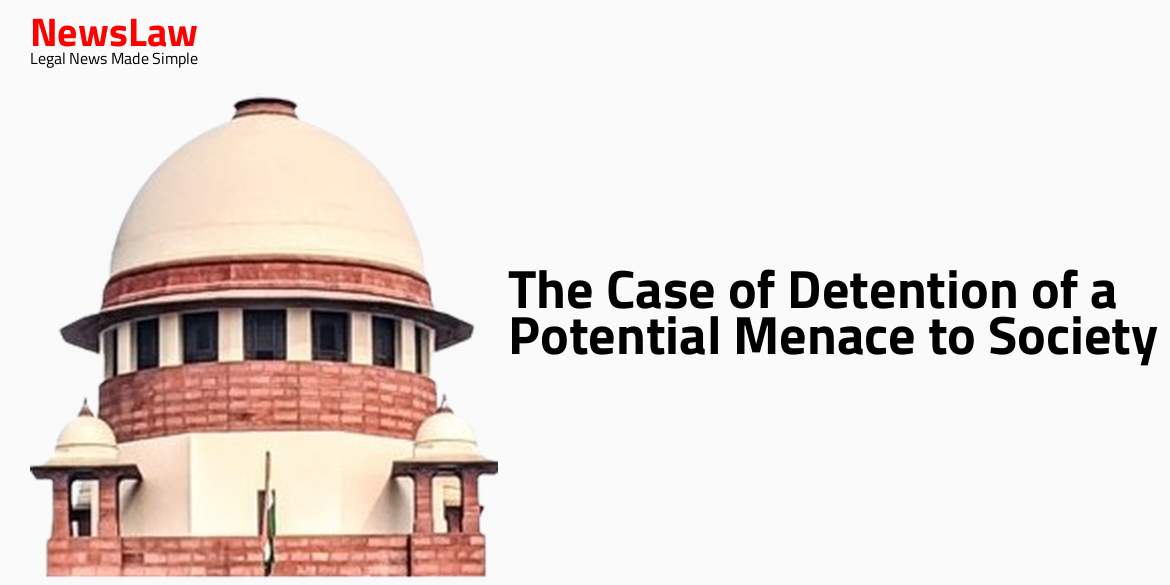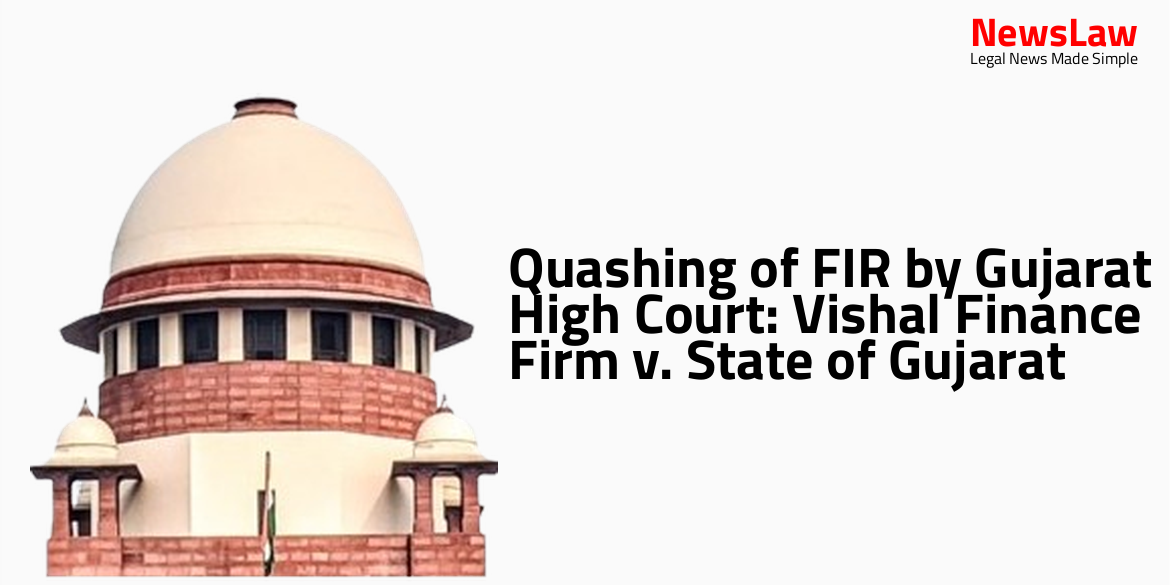The recent judgment by the Gujarat High Court involves the quashing of a detention order under the Gujarat Prevention of Anti-Social Activities Act, 1985. The case delves into the delicate balance between personal liberty and public order, emphasizing the need for precise application of preventive detention laws. The Court’s decision highlights the significance of upholding constitutional values while scrutinizing detention orders. Stay tuned for insights into the case and the implications of this crucial ruling.
Facts
- Present petition is against the order of detention dated 06.01.2024 under the Gujarat Prevention of Anti-Social Activities Act, 1985.
- The detaining authority passed the order under Section 3(1) of the Act.
- The petitioner is the detenue as defined under Section 2(c) of the Act.
Arguments
- The petitioner’s advocate argues that the detention order should be quashed as it is solely based on the registration of two FIRs.
- The offenses mentioned in the FIRs do not bring the petitioner’s case within the definition of the Act.
- The alleged illegal activities do not have a nexus with the maintenance of public order but rather with law and order.
- There is lack of concrete evidence besides witness statements and FIR registrations to demonstrate that the petitioner’s actions disrupt public order.
- The advocate contends that the petitioner’s activities have not disturbed the social fabric or posed a threat to the existence of normal life.
- The fact that the petitioner is out on bail in all offenses should have been considered by the detaining authority.
- The learned APP supported the detention order and stated that sufficient materials and evidence were found during the investigation to justify the order.
- The detaining authority’s subjective satisfaction was found to be not legal or valid as the alleged offenses in the FIRs did not pertain to public order, which can be dealt with by other penal laws.
- Allegations against the detenue did not align with the criteria under Section 2(c) of the Act for disturbing public order.
- For a person to fall under Section 2(c) of the Act, there must be material showing they pose a threat to society and disturb public order, which was not demonstrated in this case.
- There was no specific material demonstrating the detenue’s actions as dangerous to public order.
- Reference was made to the case of Vijay Narain Singh vs State of Bihar, where the Apex Court clarified the legal position.
Analysis
- When a person is enlarged on bail by a competent court, caution should be exercised in scrutinizing the validity of an order of preventive detention based on the same charge to be tried by criminal court.
- Several detention orders under the Telangana Act of 1986 have been set aside by the High Court of Telangana in the last year.
- Offences alleged could attract punishment under the Andhra Pradesh Prohibition Act, but preventive detention should not be the remedy.
- Preventive detention is usually for a year and should not be used to keep a person in perpetual custody without trial.
- Preventive detention should not substitute ordinary law or absolve investigating authorities of their duty to investigate crimes the detenu may have committed.
- The order does not mention any application for cancellation of bail filed by State authorities.
- A mere disturbance of law and order leading to disorder is not necessarily enough for action under the Defence of India Act but disturbances subverting public order are crucial.
- Over the past five years, the Court has rejected more than five detention orders under the Telangana Act of 1986 for misapplying the public order standard and relying on outdated material.
- The analogy of three concentric circles is used to explain the relationship between law and order, public order, and security of the State.
- Not every act of assault or injury to specific persons results in public disorder.
- The personal liberty of an accused should not be compromised solely based on preventive detention powers, which are exceptional and draconian.
- The detaining authorities and the respondent-state have been criticized for a callous use of preventive detention powers.
- The distinction between ‘law and order’ and ‘public order’ has been clarified in various judicial decisions.
- The importance of upholding personal liberty and exercising criminal and preventive detention laws cautiously is highlighted.
- The need for a proper appreciation of facts before issuing detention orders is emphasized.
- The difference between disorder, law and order, and public order is distinguished in legal terms.
- Preventive detention laws should not be misused, and the exceptional powers should be exercised judiciously.
- Personal liberty protected under Article 21 is a high constitutional value that must be meticulously followed by detaining authorities.
- Detention can only be warranted if extremely necessary and if the activities of the individual impact public order.
- Authorities must consider the provisions of Articles 21 and 22 when passing detention orders.
- Article 22 is an exception to Article 21 and should only be applied in rare and exceptional cases.
Decision
- The petition is allowed and the order of detention dated 06.01.2024 is quashed and set aside
- Direct service is permitted
- The detenue is ordered to be set at liberty forthwith, if not required in any other case
- Rule made absolute to the above extent
Case Title: RAKESHBHAI @ RAKYA S/O. PRAKASHBHAI WAGH Vs. STATE OF GUJARAT
Case Number: R/SCA/1956/2024



